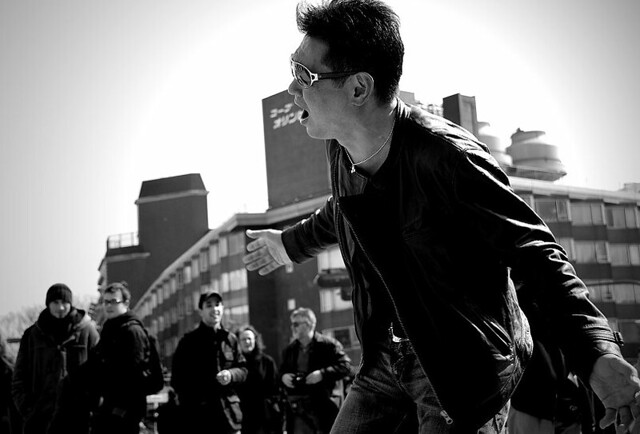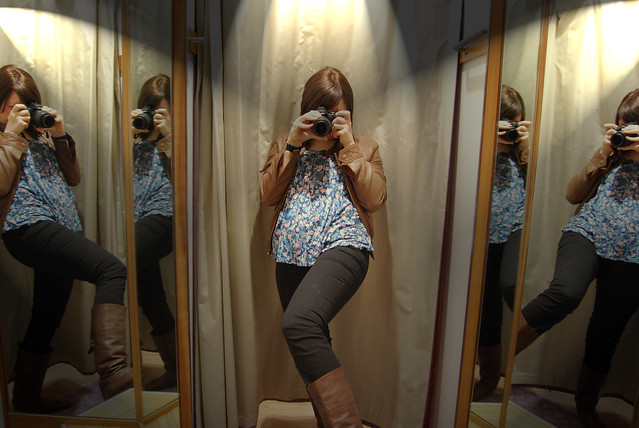There may come a time in your life as a photographer when you suddenly find your own photographs distasteful. This is a time when you feel restless, frustrated, and dissatisfied with the images you've recently created. You then realize that it’s not a one- time ordeal and it's already been awhile since you started experiencing this. It’s not that you don’t know how to create beautiful shots because you've done it before and quite often too. You've created images that surprised your friends and family. Ah, it even surprised you so much that at one point you even thought of turning pro. And maybe you did turn pro. But somehow, things don't seem to fare well and it feels as if your creativity has plateaued, or worse, regressed. If there was a photographer’s quarter-life /midlife crisis, this would probably be it.
There are two ways to approach this dilemma. You can end your dream of being a world class photographer and sell your gear at a ridiculously low price or you can try to find ways to get out of this seemingly twilight zone you've gotten yourself into. The question though is how.

Photo by Ryan Hyde
Before we answer how to get off this awkward feeling of always creating boring shots, we need to understand what is happening in the first place. We need to answer why you are experiencing it. Is it a skill deficiency? Perhaps, has your passion for photography started to dwindle? You may or may not yet be in this situation, but the possibility of experiencing it is there.
The Cause
There may be several reasons why this happens. It can be caused by a drop in excitement level, lack of skill, the absence of new things to learn, or too much common shooting opportunities that leads to boredom.
Do you remember when you started doing photography? You were so excited about everything from understanding camera bodies, lenses, lighting equipment, and even enhancing your images for hours with Photoshop. Even reflectors, filters and slings were very interesting at that time. It's a time when you suddenly see a big difference between your old pre-basic photography class shots and your i-feel-like-a-pro-after-basic-class photos. In fact, as you continue to learn more, you also see big positive changes in the way you create your images. The improvement is so huge that it keeps you excited. But the more you progress, the less improvement can be seen. Not because you’re learning less, but because you’re seeing less of the differences in your shots. The once steep learning curve is beginning to flatten out.
The Effect
Truthfully, your photos probably still look great. Friends and family will still commend you and many will still be amazed at what you have done. But there’s this inner voice that just tells you it’s not good enough. It relays a message that your shots are too common, usual, and unappealing. It’s irritating, yes, but there is some truth behind the unspoken words because you have probably reached your maximum capacity as a photographer at that level and you have stayed there for too long. What used to amaze you is now an old personal norm. The subjects that you’re taking are becoming too mundane and irrelevant. Your inner photographer is suddenly telling you to create something spectacular, but somehow you still feel lost and confused.

Photo by Jesslee Cuizon
The Solution
The solution to this dilemma is both simple and difficult. It is simple because you only need to give in to what your creative soul is telling you to do – to produce photos you have never created before. But we know as photographers that this in itself is not an easy especially when creative blocks are present. The difficulty lies in finding the how.
The good news is that this is something that can and should be taken positively. This is the perfect opportunity to assess yourself, your skills, your style, and the way you've been doing things. It's giving you the chance to get better. It’s like your best self saying it’s time for you to level up. Here are some steps you can take when you encounter this photography crisis:
1. Define Your Photography
Awareness of your current style is first in the list of things to do. Do you like landscapes and avoid people? Do you strictly follow the rule of thirds or keep your shots tack sharp? Do you find the need to always have hair light in your portraits? Defining your techniques, your usual style, and the way you do things is important to figure out how to break the pattern of the common. Awareness is the key to finding out what you need to change in order to get better and eventually love your photos again.
2. Abandon the Same Techniques
Go against the usual techniques you’ve been using. Don’t worry it’s not permanent. You’re just allowing your creativity to wander. If you’re used to panning shots, totally avoid it. If you like frozen action shots, try to get some blur in there. If you like using negative space with your portraits, try to get things a little busy in the background while still keeping things balanced. Try shooting landscapes in portrait orientation. Break rules, habits, and thought patterns. If it feels like it’s not you, it’s alright. Just do it anyway. Your creative self is trying to let itself loose.

Photo by jeff_golden
3. Choose a Different Genre
Try a different genre totally different from what you’re used to. If you’ve been shooting nature for the longest time, try the other route and shoot urban and street scenes. Portrait photographers can try avoiding people shots for now. Of course, if you’re a pro, you don’t need to ditch your clients. You can do this during your non-income photography time. Drastic feelings require drastic measures and shooting everything else except your favorite genres will help.
4. Challenge Yourself with Difficult Projects
What you want for yourself is the skill of a pro and the learning attitude of a beginner. People who discover photography for the first time are so fired up they want to learn everything. It is that attitude that helps them learn faster and see huge improvements in their art. Engaging in project concepts that are difficult and challenging can help you get that excitement level up again.
During the time when I too felt the plateau in terms of my own work, I challenged myself to make images of regular objects float from jewelry, coins, crayons, and shoes. The difficulty was in the parameters I gave in terms of execution – I can only do universal editing during post, the shot cannot be a composite image, and the only light I can use is a hand-crank LED flashlight. The photos I created amazed me. It wasn’t at par with the other images I’ve seen, but I successfully created something I feel was very tough to pull off. I was proud of myself.
5. Take a Vacation and Travel
Traveling is one of the best educational experiences you can ever have. It opens up your mind and allows you to discover new things. It just changes you.
When you travel, choose to go to a culture totally different from your own. Aim to experience culture shock. The more unusual it is for you, the more your creative cells become excited. Keep yourself amazed, astonished, and excited with what you are seeing. It’ll give ideas you never thought was possible. With this you will see how you can transform your photography through the experience.
6. Imitate the Work of Photographers Who Inspire You
New ideas spring up because of inspirations coming from the creations of other people. Whoever invented the escalator had prior knowledge of the existence of stairs and may have been using it quite a while giving him ideas for his mechanical version. In the same way, learning a different technique or style can help you get over the usual things and help you see different results. Find photos that currently inspire you. Try to imitate someone else’s style. Create it almost identically if you can from the lighting, composition, down to post processing. Don’t publish it though. It’s just for your personal benefit.

Photo by liz_com1981
There’s a whole lot more you can try. The key to getting off boredom from your own work is to keep your mind stimulated with new things and getting off from your usual creative routine. Change is essential and seeing a different result will keep your sanity intact and your photography at a whole new level.






6 Comments
These are all very reasonable and true, not only concerning photography block, but in any other creative activity. The only way around is fighting it fiercely, never waiting!
Great article Karlo!
I too have fallen into ruts with my photography…it happens to most of us at one point!
Good tips for helping to break out of the slump
Jim
Great article, its happening to me right now.
Thanks guys. 🙂 Glad you liked it. And yeah, it happens to a lot of us. I had my share of it. Even took a hiatus once.
Is there room in photography world for someone who doesn’t like to do a lot of computer editing? I know there is some amazing editing stuff (I do have Elements 9) but I don’t enjoy using it.
There still is Bill. I know of some purists who still want to keep things unedited. I’m not a fan of spending time processing images either. On average I only spend a minute or two with my photographs and mostly universal edits.